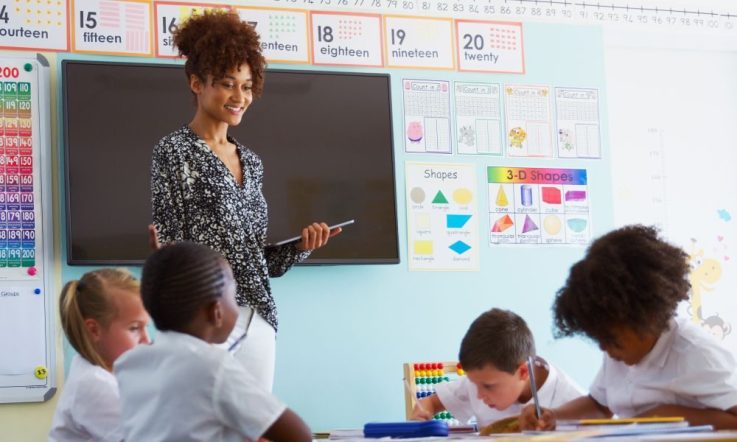This podcast from Teacher is supported by Sora, the student reading platform that provides access to curriculum and popular digital books for schools. Learn more at discoverSora.com/global.
Hello and thanks for listening to this Teacher Staffroom podcast from Teacher magazine, I’m Rebecca Vukovic.
It has been an exciting month here at Teacher magazine because we launched our new monthly themes. Each month, we will take a look at a particular area of education and publish an article exploring that theme. We’ll also share some offers and opportunities from our advertising partners related to that theme. In this episode, I’ll take you through our theme for May, and give you a sense of what you can expect over the next few months. I’ll also run you through some of the highlights from our editorial, including 2 pieces on the topic of AI, and chat about a new report by the Australian Council for Educational Research that explores teacher self-efficacy in classroom management. Let’s get started.
In May, we launched our new monthly themes. Our first theme was Camps, Excursions and Incursions. Teacher Editor Jo Earp wrote an article titled Planning for a successful school camp, excursion or incursion where she explored some of the support available to make the experience of planning a camp, excursion or incursion less overwhelming for teachers.
Here’s a quote from the article:
Before you sit down to look at what’s out there, the first thing to think about is what you’re hoping to achieve. How does that link to the curriculum and, importantly, the needs of your students? You’ll also need to factor in school resources, including staff. And so, it may be that the successful experience that you or your colleagues organised last year isn’t the best option this time around. Once you have a clear understanding of the learning outcomes you want to achieve and how this will meet your curriculum goals and student needs, you [can] identify possible options.
In the article, Jo also acknowledges that individual states and territories have a wealth of information for schools, including a range of guidelines, policies and procedures, planning templates, approval forms, and useful external resources. To make it easy for readers, she links to more information from each of those states and territories.
You might have also seen this month that we published several StoryBoard articles from our advertising partners who offer camps, excursion or incursion opportunities. From hands-on history excursions and outdoor challenges to help nurture skills like teamwork and resilience, to immersive virtual learning experiences, and visits from animal experts or talented musical performers – there are plenty of resources to help you with your planning for the rest of 2025!
We’d also love to hear what you’re up to in this space. Have you been on any camps or excursions recently that you absolutely loved? Have you been going out into your local community, or even further afield? Have you preferred to invite people into your school to do an incursion? Or, do you prefer to take up digital opportunities in the form of virtual excursions? We’d love to hear all about it so send us an email to tell us your story.
To make sure you don’t miss out on the next themed month, make sure you subscribe to our free email bulletin. I’ll leave a link to the sign-up form in the transcript of this episode.
We’ll be back after this quick message from our sponsor.
You’re listening to a podcast from Teacher magazine supported by Sora, the student reading platform that provides anytime access to digital books for students. Sora offers curriculum titles, along with popular leisure titles, including the Children’s Book Council of Australia’s (CBCA) shortlisted titles, free for participating schools. Visit discoversora.com/global today to learn why Sora is a worldwide leader for digital ebooks and audiobooks for students and teachers.
Artificial intelligence is a topic that our readers tell us they want more information on, so we have made concerted effort to publish more on this important subject. I have 2 that I’d like to share with you today. The first is a new column from Professor Martin Westwell – Chief Executive of the South Australian Department for Education – where he shares the thinking behind a generative AI chatbot that has been custom-built for teaching and learning. Martin says:
In 2023, when others were talking about banning AI in schools, we introduced EdChat, a generative AI tool, into 17 high schools across both metro and country South Australia starting with early adopters in the metro area and then expanding out to include more. We didn’t prescribe strict usage rules or define narrow objectives. Instead, we launched EdChat with guardrails to ensure safe and ethical use, and then gave students and teachers the freedom to explore, adapt, and respond.
Make sure you read the full article to hear more about the impact that EdChat is having on teaching and learning in South Australian schools. But for now, I’ll leave you with this quote from Martin from the article:
As a public education system, we are strongest when we listen – to our data, and to our teachers and students. In embracing EdChat, we chose responsiveness over rigidity, learning over waiting, and trust over control. The result is a living, evolving understanding of how AI can serve education, not just in theory, but in practice, everyday, in classrooms all across our state.
The other piece I wanted to share on the topic of AI is a podcast Jo Earp recorded with Dr Katie Richardson, a Senior Research Fellow at the Australian Council for Educational Research.
In the episode they discuss 3 broad areas where AI can enable improvements in education, and what that might look like. They also discuss how teachers need to be careful and purposeful in using the different AI tools with their students to promote thinking and learning. In this clip I’d like to share from the episode, Katie is discussing what AI can and can’t do, and what it can’t replace.
…we need to be careful and purposeful in how we use it with students so it can promote thinking and learning and not replace it. So, there's a couple of different aspects that we need to think about in terms of explicit teaching. Number one, we need to teach explicitly the metacognitive skills that the students need in order to engage with and interact with particular concepts and skills – so we've got to get them to do that. And these are concepts and skills that, particularly at [lower] schooling levels, the AI could easily sort of come in and replace, but probably not replace well. So, we want the students to actually have a chance to develop those skills without the AI. Then with AI, we have to also explicitly teach them how to use the AI. Because students don't natively just come in and go ‘oh, this is ChatGPT I have to give it really explicit prompts and I have to tell it exactly what I need it to do and then say no, that's not correct, can you please do this, and AI will respond’. If they haven't been taught how to do it, they'll give it a prompt and ‘oh yeah, that's a great answer’. Hand it in. So, number one, we have to teach them explicitly those skills that they need to have in order to be critical of the AI. Number 2, we need to teach them how to use the AI explicitly. And number 3, we have to teach them how to be critical of the AI outputs.
After listening to the full episode, consider these questions:
Thinking about a planned future use of AI with students: What do you want them to learn before the process of using AI? What skills will they need to develop before they use the tool in order to engage with it critically and effectively?
And finally, the last article I wanted to highlight is a piece on teachers’ classroom management skills and confidence. The article shares findings from a new report by the Australian Council for Educational Research that explores teacher self-efficacy in classroom management. It provides some great prompts for thinking about your own skills, practices and professional development needs, and if you have a leadership role, those of your team. The report’s author, ACER Research Fellow Catherine Underwood explains teacher self-efficacy ‘refers to a teacher’s belief in their capability to help students learn, and to influence their activities, effort and persistence in the classroom’.
Here's a quote from Catherine from the article:
Teachers with high self-efficacy are confident in their ability to positively influence student learning; they display enthusiasm, commitment to teaching, positive expectations and a proactive teaching style while creating a supportive and engaging classroom environment. In contrast, those with low self-efficacy avoid planning challenging activities, lack persistence with struggling students, invest little effort in sourcing materials, and do not modify their teaching methods to enhance student understanding.
To read more – including findings related to teacher confidence in their ability to maintain positive relations with students, and use of teaching practices and assessment strategies – download the full report from the ACER Research Repository.
That’s all for this episode. Thanks for listening. I’ll leave the links to the full articles and podcast episodes I mentioned today in the transcript of this episode, which you can find under the podcast tab at our website. We’ll be back with a new episode very soon.
You’ve been listening to a podcast from Teacher magazine, supported by Sora, the student reading platform that provides access to curriculum and popular digital books for schools. Learn more at discoverSora.com/global.



